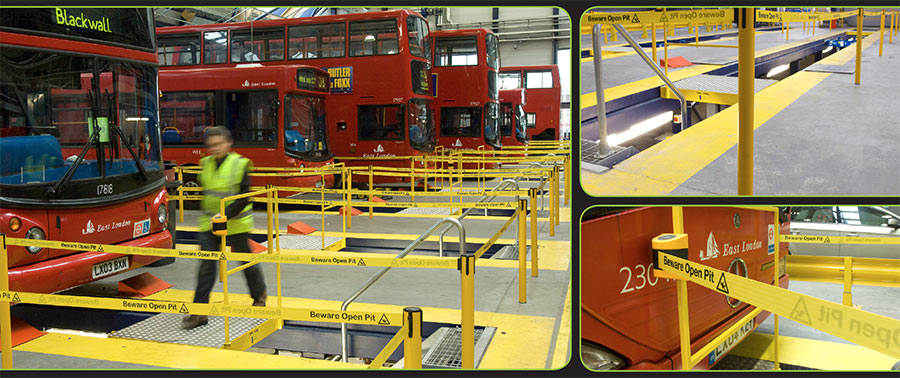- Home
- Sectors
- Solutions
- Tensabarrier®
- Tensator® Charging Stations
- Tensamedia® Wayfinding and Signage
- Lawrence® Post & Rope
- Tensator® Airport Passenger Guidance System
- Electronic Queuing – eQ™
- Tensaguide® Modular Barrier System
- Tensator Micam Protection – TMP
- Safety Solutions
- Access Control
- In-Queue Merchandising
- Holographic Virtual Assistant
- Virtual Queuing – VQMS
- Custom & Bespoke Solutions
- Resources
- About
- Contact Us
- Shop
 English (English)
English (English)
Tensator’s Safety Barrier System Now on the Buses
16
Sep

Recognizing the dangers
In the last five years alone there have been over 8,000 injuries in the motor industry, so businesses cannot afford to ignore the health and safety of their employees. Focusing on vehicle repair centers, the Health and Safety Executive (HSE) has designated inspection pits as a ‘fall from a height’ hazard and subsequently created ‘working from heights’ regulations to provide guidance on how to reduce dangers and prevent accidents before they happen. Stagecoach senior management recognized from the outset that its depot vehicle inspection pits – which are up to 21 metres long, 1.5 metres wide and almost 2 metres deep – were a hazard that needed to be addressed.
As a proactive organization, Stagecoach continually strives to improve health and safety in the workplace. In line with the HSE’s recommendations, the company looked at ways their bus depots and vehicle repair workshops could be improved, with particular emphasis on the vehicle inspection areas.
The right solution
Graham Whitelocks, Stagecoach UK Bus Director of Safety, Health & Environment, said: “Safety is our top priority and at the heart of everything we do. We continually look at how we can improve the working environment and make it safer for our people. We knew the inspection pits were a particular danger in the workshops, so we decided to take a preventative approach to addressing the issue.”
“After a successful three week trial, the safety system was rolled out across more than 100 Stagecoach depots nationwide.”
In October 2009, Stagecoach UK Bus turned to world leading queue management specialist, Tensator, to help improve the safety of its bus maintenance depots. With extensive experience providing health and safety solutions, Tensator worked with Stagecoach to provide consultancy and produce the right system to suit their needs and match their exact requirements.
As part of an initial trial at Stagecoach’s Hastings depot, Tensator developed and installed its high visibility barrier system with pit protection posts to cordon off dangerous pit areas. Simple clips connected the webbing posts to pit bridges, with retractable technology allowing the safety barrier system to move with the bridge, ensuring that the pit is cordoned off at all times. Tensator designed the system to include high visibility yellow webbing with ‘Beware Open Pit’ messaging, and accompanying visuals, in order to be clearly seen by engineers and ground floor staff.
After a successful three week trial, the safety system was rolled out across more than 100 Stagecoach depots nationwide. Tailored to meet the individual workshop requirements, installations began in late September 2009 and were completed by December the same year.
Seeing the benefits
Not only has Tensator helped Stagecoach take a preventative approach to the safety of its employees, but it has also helped ensure it is in line with HSE regulations.
“We are delighted by Tensator’s approach to our requirements, right from the initial consultation stage through to the trial and subsequent full roll-out.”
Graham Whitelocks says: “We are delighted by Tensator’s approach to our requirements, right from the initial consultation stage through to the trial and subsequent full roll-out.” Tensator’s system is extremely flexible and connectable to wall mounted barrier units, making it perfect for installing around all existing Stagecoach pits or integrated in new builds. It also means mechanical engineers can easily work with the product by simply retracting the webbing to work within specific parts of the bus.
“Using Tensator’s pit protection technology is helping ensure our employees are safe and accidents that might otherwise occur are prevented.”
Look to the future
Stagecoach continues to look to the future and take further steps to improve safety within its bus maintenance depots. Since the system installations in 2009, the company has gone on to order more of Tensator’s safety barriers and posts. Tensator is confident that the success of the current projects will lead to a continuing and mutually beneficial relationship between the two companies, and expects strong interest in a number of new products currently in development.
[ww-shortcode-button icon=”fa fa-chevron-right” icon_position=”left” label=”Download Full Case Study (PDF)” colour=”preset” type=”slightlyrounded” size=”medium” link=”http://www.tensatorgroup.com/downloads/stagecoach-case-study-pdf/” target=”_blank” animate_type=”fade-in” ][/ww-shortcode-button]
Stagecoach UK Bus is one of the country’s largest public transport providers, with a fleet of around 8,100 buses connecting more than 100 communities across the United Kingdom. Stagecoach is committed to providing the highest quality of service for its customers and has invested nearly $465 million over the last four years in some of the latest state-of-the-art buses, all of which are fully accessible to the elderly, those with small children and the disabled.
Employing around 23,000 people nationwide, Stagecoach UK Bus is dedicated to the safety and wellbeing of its staff and continuously looks for ways to improve the working environment.
Employing around 23,000 people nationwide, Stagecoach UK Bus is dedicated to the safety and wellbeing of its staff and continuously looks for ways to improve the working environment.



